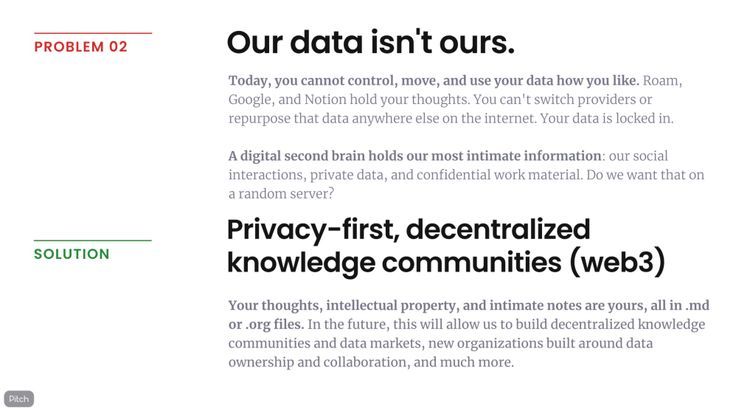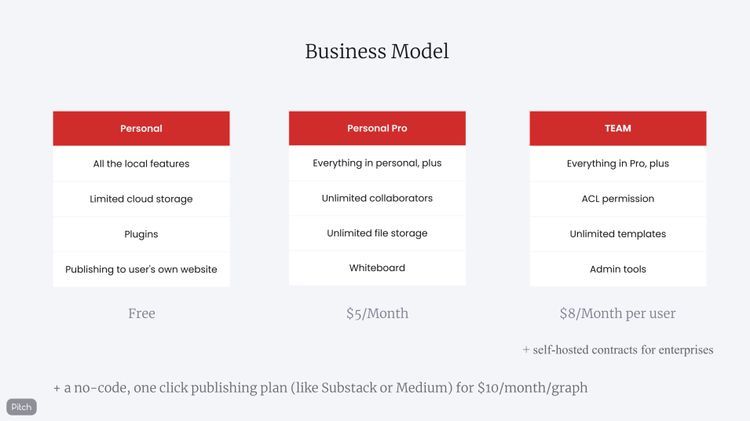Devon's clippings · Clipped: Sun-31-Oct-2021 · Original:
instapaper.com/read/1271648397
Notion – The all-in-one workspace for your notes, tasks, wikis, and databases.
notion.soBackground
Devon asked me to explain my takes on Logseq business model. But I have a lot of thoughts so I thought I'd just write it down.
Logseq is raising money and they're an open-source Roam-clone that stores your data locally as markdown files, very similar to Obsidian.


Logseq’s business model is right out of the SaaS playbook. If all goes well, they’ll make massive amounts of money catering to enterprise customers, just like Notion, Slack, Figma, Airtable, and Coda. I don't think this is a bad business model and its clearly worked before, but there are some trade-offs.
Let's assume that Logseq wants to pursue this business model to become massively successful, like Notion. You're going to get to a point where a medium-sized enterprise customer (200+) can't effectively collaborate using synced markdown files. So you're going to have to build something more complicated, some kind of custom format and syncing protocol.
And now you have a choice, become a Cloud SaaS company and use Firebase or whatever. Or remain a Local-First company and invent a peer-to-peer syncing protocol / data format.
Making the decision even more difficult are the power dynamics at play:
Enterprise customers want to be able to revoke permissions from an employee and make sure the employee no longer has access to the data. And you can easily do this when all of the data is gated by the Cloud.
Personal user users, maybe a group of students working on a project together, don't want anyone to be able to delete something that they've put their hard work into. For personal users, it is desirable that everyone gets to keep copies of document and once the permission is revoked, edits start to diverge.
This second approach is basically how git works. And companies are OK with employees using git because managers have a hard time telling programmers what tools they have to use. And programmers want to use git because the distributed design of git makes it way faster.
There's a very compelling reason for a company with this business model to become a Cloud SaaS company. You'll have to invent fewer things and the road is paved with lots of money... And so if you want to avoid this path, it's going to take a considerable amount of effort and conviction.
It all comes down to goals and values. Do you want to empower individuals or organizations? Are you committed to privacy even if it means some people will do bad things using your tools? Do you want to try to make as much money as possible, or are you more interested in other kinds of outcomes?
I have thought about this a lot because I saw how it happened at Notion. After just two years, Notion was a rocket ship and we flew past these decisions faster than I could digest them.
Personally, I want to build a Local-First product and I don't ever want to maintain Cloud infrastructure again. I don't have all the answers but I can share the extent to which I've thought about this for the next thing I build.
At a high level, I've thought a lot about my values. And I've tried to articulate them in this unfinished article: The Toolmakers Ethos (Draft). But more-or-less, I want to create software that empowers individuals and promotes self-reliance. I want to empower organizations from the bottom-up just like Git, and I want users to be able to own all of the hardware necessary to operate this software. I want my software to be so rock-solid that you can find it all the places you'll find SQLite, from battleships to power plants. Think about how horrible an idea it would be to run an oil refinery using something like Notion or any other Cloud SaaS product.
And so lies the question: how do you make money?
One option is a dual license. This is what Unreal Engine does. But this isn't as suitable for product for end users.
SQLite makes money through consulting and licensing out their test suite to the aerospace industry. But this also doesn't make sense for an end-user product.
The best solution I've seen so far is the Sublime Text model.
People want to try software before they use it. The freemium model is really good for getting users.
The main way of encouraging users to buy the app is by reminding them after some amount of usage that the app "isn't free" and they ought to pay for it. The main enforcer here is guilt and shame. And if the price point makes sense, users should feel comfortable paying.
This model discourages pirating because users can already use it for free and just ignore the popups asking for a purchase.
We can also put a hard-stop in there, e.g. after a user creates 1000 pages, where the user if clearly getting enough value out of it to pay for it.
We can also create a certain kind of subscription model where you pay $1 for the app and 1 month of updates. This creates a recurring income stream while also respecting people's ownership, allowing them to cancel their subscription and continue using that version of the app for the rest of time.
Is this a "great" business model? I'm not sure... It will probably make less money than the Cloud SaaS model unless is far more ubiquitous. It's similar to WhatsApp — if you have a billion users paying a dollar a year, you're making a lot of money...
Also, ideally there'd be a way of doing this, all while also being open source. I'm not all that interested in open contribution (SQLite isn't, i.e. Bazaar vs Cathedral development), but I think one of the reasons that VSCode is so popular is because people are confident that all of the plugins that they build for VSCode are not going to be undercut later by some business decision at Microsoft because they can always fork it. And the same goes for SQLite.
Meanwhile, Notion acquires Automate.io to build all of their integrations because they can't count on the community doing it for them.
Anyways, there's no conclusion here. Just a bunch of thoughts that are still floating around unresolved... Let me know what you think!